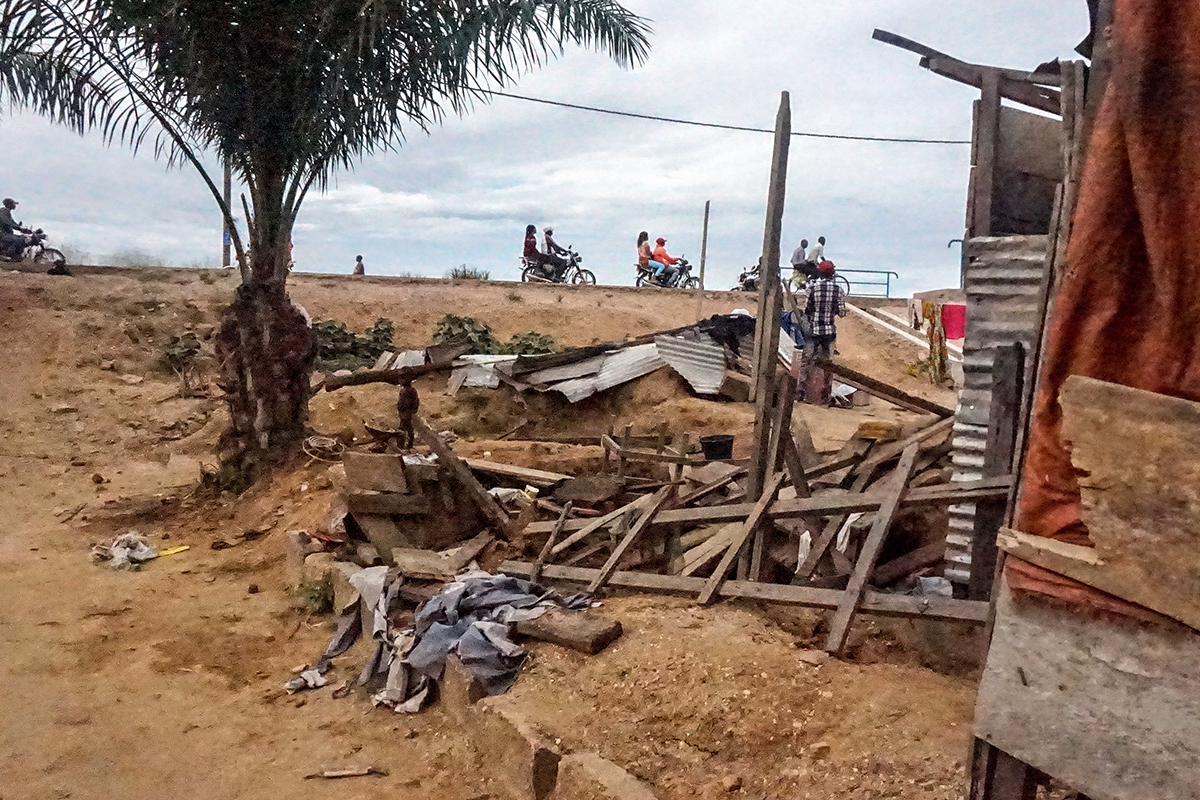
Nadia Kanyere Karasisi, GPJ DRC
Alphonse Nganda and his eight children are renting a small home after their house was demolished by a government operation in April.
MAKISO, DEMOCRATIC REPUBLIC OF CONGO — Alphonse Nganda moved with his eight children into a comfortable home in 2013, in the Makiso municipality near Kisangani. He says things were going well until he received a notice in 2015 that his home was built in a restricted zone that was prone to flooding.
But years went by after the first notice, so Nganda disregarded it, he says.
Then, in April, his home was razed by the provincial government with no warning, he says.
Nganda has permits to build, fish and farm on the land. He also has a deed showing ownership of the home that no longer stands on the land. But authorities say his home and dozens of others nearby were built in a low-lying area that is prone to flooding and where a construction ban has been in effect for years. Government officials were not able to confirm when the ban officially began.
To raise awareness of the construction ban, the provincial government of Tshopo carried out a campaign in these areas for five months earlier this year, but Nganda says he knew nothing about the ban.
“If the government declared a construction ban, this plot of land should not have been sold in the first place,” Nganda says of the land where he built his home. “Now they destroyed our home.”



Since April, about 30 homes in the area have been demolished, and dozens more homes were not fully demolished only because of a lack of working machinery, says Achille Osiyo, head of the bureau of statistics in the Kisangani city government.
The order to demolish the homes in the low-lying areas covered by the construction ban came from the provincial civil court in April.
In total, more than 700 people were displaced after the government razed their homes, Osiyo says.
No deaths were recorded during the demolition, Osiyo says, but 10 residents were wounded. The total value of the damages is unknown, but residents say they lost furniture, television sets, household goods and family valuables worth thousands of dollars.
Olivier Katanga, mayor of the Makiso municipality, supervised the demolition and says he is confident that all residents living in this area were doing so illegally. He says the land titles department would not have issued building permits in this area.
But many residents do have the deeds for their land.
Theo Mambiaki, whose home was destroyed in April, also has documents from the service des titres fonciers, the local land titles service, documenting ownership of his home. His small home was demolished without his knowledge or any outreach from the authorities.
“We have parcel documents issued by authorities of the municipality,” Mambiaki says. “I was never informed of the construction ban or the intent to raze my home.”
For residents whose homes were destroyed, it remains unclear what recourse they have for compensation.
“They’ll have to look for the people who took their money, to have restitution,” Katanga says, adding that anyone who owned homes in this area purchased them illegally from a third-party seller.
Katanga says that if residents ignored months of radio and neighborhood awareness campaigns, which included people driving through the area using a loudspeaker, there is nothing more he could have done.
Still, residents say the decision to demolish homes, often without residents’ knowledge and when they were not home, was unfair.
Catherine Nato, whose home was demolished in April, says she’s still homeless.
“The provincial government should refund our money and grant us another plot of land,” she says. “We are waiting for a clear answer.”
Legal action from residents is likely, says Germain Bahati, a lawyer at the Kisangani Bar Association. Bahati says Congolese law permits citizens to sue the government in the country’s high court.
“It is the right of these people to receive sufficient awareness before [the government] proceeded with the demolition operation,” Bahati says. “The government made this decision, and now they should put together palliative measures to help this population.”
Citizens can be reimbursed for damages caused by government action in some cases, but that’s not likely, Katanga says. The court order was clear that people who were living and building illegally would get no government assistance.
Residents say they are working to prove a track record of legal ownership, so they can pursue justice in court.
But that is proving difficult in some cases.
“We were not able to find the person who sold us our land,” Nganda says of the broker who sold him the land back in 2013. “They ran away when they heard that we were searching for them.”
With the legal status of his land purchase unknown, the next step is unclear.
“We don’t know what to do,” he says.
Ndahayo Sylvestre, GPJ, translated this article from French.






